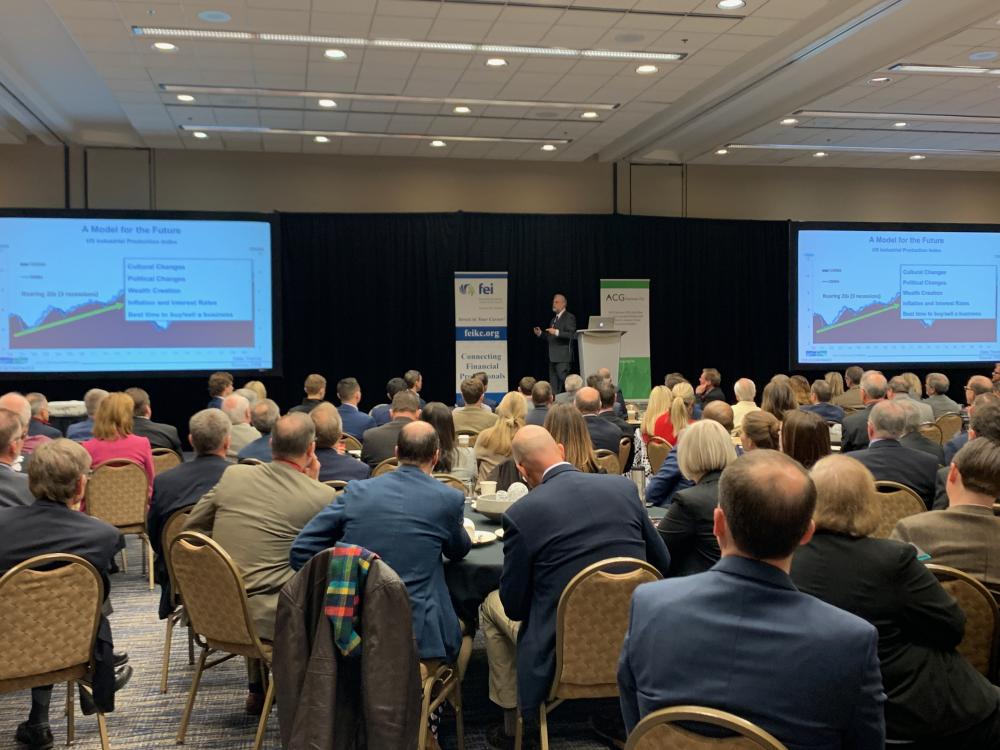

Here’s the good news: our economic outlook for the next few years is good. The bad news? Another Great Depression is headed our way in about 10 years.
Those were the messages delivered at “2020 Economic Forecast: Planning with Optimism,” the first ACG Kansas City breakfast meeting of the year held on January 10. ACG members joined with members of FEI Kansas City for a presentation from Alan Beaulieu, president and principal for ITR Economics.
Beaulieu offered the more-than-300 attendees an insider’s view of what to expect, sprinkled with advice on how to prepare themselves, their businesses and clients for what lies ahead.
On the local front, Beaulieu sees an uptick in the economies of both Kansas and Missouri for this year.
However, one significant concern he has is the number of millennials the Kansas City area is attracting. The area, he said, needs to have a solid plan to really bring that age group in.
“What are you doing to attract people? To create buzz,” he said. “Kansas City can do it.”
While many might concentrate their forecasts and efforts on the upcoming election season, he said that it is unimportant which party is in power.
“The average rate of growth under Democrats and Republicans is virtually the same,” Beaulieu said. “The economy adapts. The economy is going to do what it is going to do.”
Beaulieu had several ideas for what businesspeople should be doing now to better prepare themselves for the ups and downs of the coming decade and beyond. He predicts a steep recession in 2022 and 2023 before another uptick in the middle of the decade, followed by the decline into depression.
First, start really looking at every aspect of your business and weed out whatever, whether it’s a piece of equipment, a process, a person or an entire department or line of business that isn’t working.
“Challenge everyone in the organization on it,” he said.
Next, decide now, while times are good, what you need to be doing or buying to prepare for the recession of ’22-’23.
“Build your system now to take care of the future,” he said.
Beaulieu also cautioned the audience against assuming they aren’t a part of the problem.
“Ask yourself, ‘Am I still willing to take risks?'”
If your answer is “no,” then maybe you should cede leadership to someone else, he said.
When it comes to some hot-button topics such as tariffs, climate change and international business, Beaulieu offered these observations:
-
The strategies and tactics for going green or enacting a Green New Deal aside, everyone needs to understand that the cost of doing that has “the potential for inflationary pressures and more federal debt.”
-
For the first time in history, the United States is able to be energy independent, an excellent change for the economy. Referencing the recent troubles with Iran he observed, “Oil today was at $60 a barrel. Can you imagine if this was 10 years ago? Oil would be back to $100 a barrel.”
-
People shouldn’t be afraid that manufacturing businesses are fleeing the United States, he said. “They aren’t. More businesses are coming in than are leaving,” Beaulieu said. “If you want to put manufacturing out of business, go back to the way it was done in the 1970s. Robots don’t take jobs, they create jobs. There is a record amount of jobs open in manufacturing.”
What will the next Great Depression look like? Beaulieu said that this is the time for a long-view outlook. The Depression isn’t going to be about fallen banks or zombies. No one needs to buy excessive amounts of gold.
“But we will see 25 percent unemployment and businesses going under,” he said.
Can anything be done to stave off the downturn?
“Adopting the Fair Tax Act could change the economy in a good way,” he said. “We should encourage older folks to talk about the end of life decisions. And, thirdly, we should enforce career education over college education. We continue to think that you’re missing out if you don’t go to college, but the fact is you may be better off if you don’t go.”
Between now and 2030, there will also be a real problem for employers when they need and want to hire.
“Boomers are going to disappear off the scene,” he said. “(There are) more Millennials than Boomers, and there will be a Millennial president in the next decade.”
He joked that Gen Xers, the smallest population would have about “six or seven months of solid power.”

Register by January 14 to lock in the lowest rate and join 3,200+ dealmakers in Las Vegas on April 27-29, 2026.
